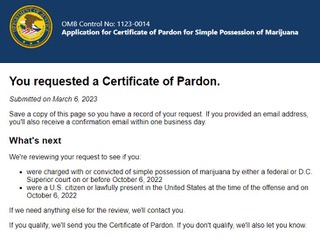A trial in federal court, even one that is over a few grams of cannabis, generates a ton of paperwork. Today, people who endured a conviction over small amounts of marijuana are applying for one additional document for our file, a Certificate of Pardon.
President Biden made a series of welcome announcements about cannabis policy last October. One of the most widely applauded among them was his decision to provide mass pardons to those thousands of Americans with a federal conviction for marijuana possession.
I am one of those Americans.
For the past five months, everyone with an eligible conviction, including me, have been waiting for information on when the Justice Department would begin issuing pardon certificates. (The Department of Justice prints a “certificate” when a President issues a pardon; it proves a person has been forgiven. Simply put: No certificate means no pardon to anyone officially asking.)
Late last week, the Justice Department finally opened the process so that people like me – and thousands of other eligible Americans – can finally acquire that profound piece of paper.

To be clear, the pardon is not an expungement and all the criminal records will remain. Any background check for a travel visa, or for a job teaching, or even to hold a government appointment or run for office, will all show that federal marijuana possession record – every time.
Nonetheless, obtaining a Presidential pardon certificate is a big deal. In the past, having a federal criminal record for marijuana possession has limited my employment opportunities, caused me problems at the US border, and has even restricted my travel. Possessing a Presidential Pardon Certificate will go a long way toward easing these situations.
Further, the Administration’s decision to follow through on this promise represents a serious shift for this President, and for the institution of the White House.
Joe Biden, like any American politician with decades of service on record, has a checkered history with cannabis policy. Biden, with nearly all of Congress in 1990s, helped create some of the harshest laws entrapping cannabis consumers in a system of police, courts, jails, probation and permanent records.
Today, the issuance of these low-level marijuana pardons is rightfully viewed as a significant first step for Biden to right past wrongs. It shows that it’s not too late for him, or any lawmaker, to make better choices on cannabis policy.
For decades, the White House itself has been central to the shaping of modern marijuana policies. From Nixon’s Controlled Substances Act in 1970 to the Cole Memo from the Obama Administration in 2013, there are few matters where the President wields such influence.
President Biden’s actions set the stage for even more significant policy reforms in the future, hopefully sooner than later.
Moreover, the fulfillment of these pardons should compel Congress to take action too.
Congress can pass laws to clear marijuana-related federal records and to release federal cannabis prisoners, among other actions. They can provide funding to states so that they can provide expungement relief to those with state-level convictions, as many state governments are already doing, or re-sentencing. And, of course, they can move to repeal America’s failed federal policy of marijuana prohibition altogether.
Thanks to President Biden, some justice is sprouting with regard to federal cannabis policy. Now, Congress should cultivate the crop.
Related
Medical Disclaimer:
The information provided in these blog posts is intended for general informational and educational purposes only. It is not a substitute for professional medical advice, diagnosis, or treatment. Always seek the advice of your physician or other qualified healthcare provider with any questions you may have regarding a medical condition. The use of any information provided in these blog posts is solely at your own risk. The authors and the website do not recommend or endorse any specific products, treatments, or procedures mentioned. Reliance on any information in these blog posts is solely at your own discretion.






